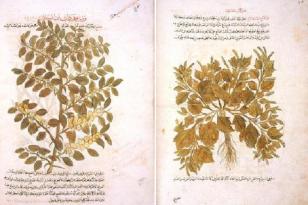Pharmacology
By: Faysal Burhan
Published: 2002
Prophet Muhammad said, “for every  sickness, there is a cure.” This means no illness should be regarded as helpless and that research should stop at no limits.
sickness, there is a cure.” This means no illness should be regarded as helpless and that research should stop at no limits.
This belief motivated physicians and pharmacists to explore nature and find the proper herb, plantation, roots, or minerals for the illness. Pharmacology in the world of Islam became a distinguished science from chemistry and medicine.
Al-Mansuri Hospital Complex
Ibn al-Baytar traveled in the Middle East and Europe searching for medicinal plants. His book, Singular Cures, offers many treatments.
His greatest work was his book, Compendium of Pharmacology. William Osler, who is considered the father of modern medicine, said that works such as the Compendium caused the Muslims to have a heavy hand in influencing modern pharmacology. 25 (Carrison, F. H).
Muslims in the 8th century invented the first true pharmacy. They invented and used the paper filter; they added rose petals, orange blossom, and lemon peel for flavor. They used alcohol for extracting the active ingredients from herbs. Drugs were dispensed by prescriptions and prepared by the pharmacists.
Drug Jar, Damascus (1000 CE)
Goldstine and Bammit said: In Baghdad alone, sixty chemists’ shops dispense drugs by prescription.
Government inspectors, al-Muhasib, regulated the pharmacies. Fines were given to adulterated drugs. Pharmacists were required to obtain a license from the Governor of the city.
Durant says the Caliph established the first school of pharmacy in Baghdad. This act inspired Georgi Zeidaon to state that modern pharmacists are wholly indebted to the early Muslims. Routine said that the pharmacy was discovered and turned into science by the Muslims of Spain and Baghdad, 80 pharmacies were.








Thanks, great article.